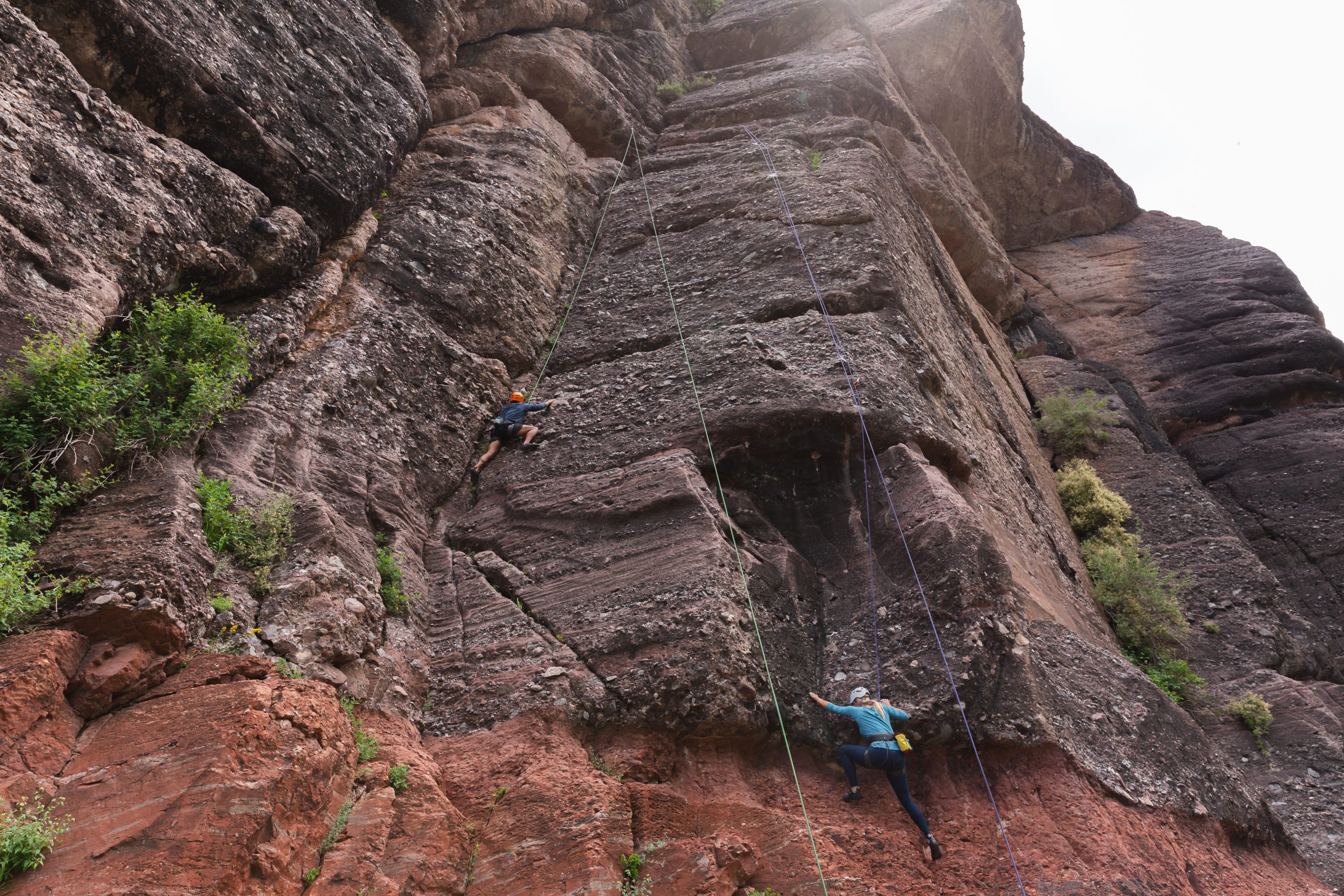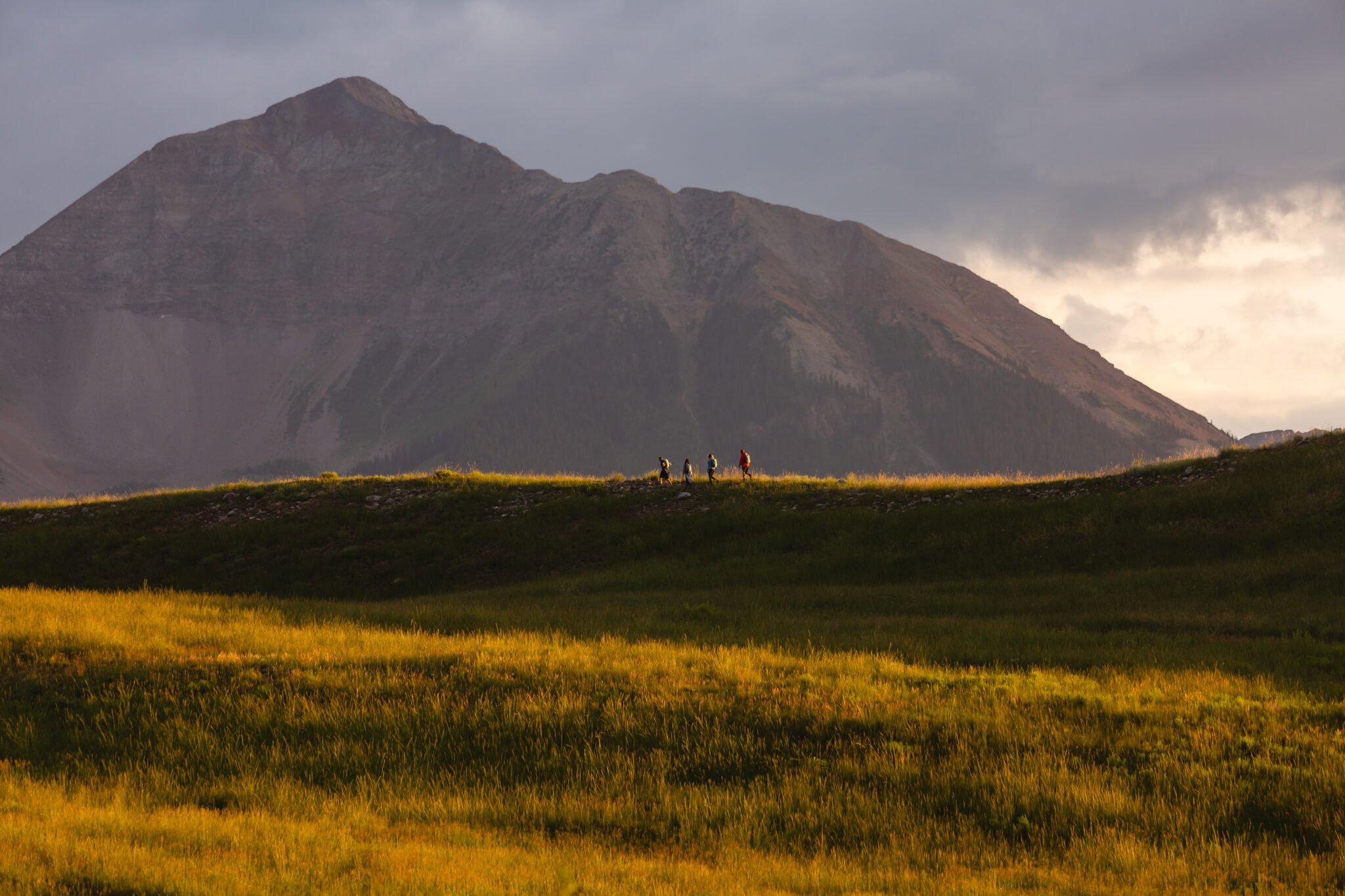We had been pushing uphill to an elevation of roughly 13,000 feet when I realized I hadn’t looked up for miles. Instead, I was paying careful attention to where I put my feet and trying to regulate my breathing in the escalating altitude. As we paused to take in the view, I raised my head and immediately experienced a sense of vertigo. The scene is breathtaking.
From our perch about two-thirds of the way up the Lizard Head trail, we can see no less than five miles in every direction. Rolling hills, blooming wildflowers, small lakes, and the stunning mountain range greet us everywhere we turn. I have spent considerable time in the Berkshires exploring the numerous trails running through the Appalachian Mountain Range, experienced the sensational fall views atop many of New Hampshire’s peaks—including Mount Washington, hiked through the Chilean Andes in snowshoes, and much more. But I have never seen anything like this.

While this trail is not for the faint of heart, it is not undoable for the average person. As a resident New Yorker, my daily “hiking” routine is limited to my not-so-taxing strolls through Central Park, which all occur at sea level. This view, which seems like it should only be accessible to mountain goats, is somehow within reach after just a few hours of hiking. As I consider this, the question that has been on my mind for the past four days is answered. This is why people who move to Telluride, Colorado, do not leave. Having this world-class view accessible through your backyard would, I realize, be a nearly impossible thing to abandon.
Even though many of the local hikes surrounding Telluride, which sits in a picturesque valley, are accessible to the average person, there is plenty of extreme adventure fodder to satiate all of its adrenalin junky residents. The hiking, skiing, snowboarding, river rafting, rock climbing, ziplining, paragliding, mountain biking, and via ferrata-ing available in this small town attracts some of the most elite outdoorsmen and women I have ever seen. As a former division one athlete, I naively went into this trip expecting to be able to hold my own in any situation I encountered. But meeting the residents of Telluride feels something akin to walking into a room full of marathoners.

Internally renaming Telluride “adventure town,” I began understanding why this small community, tucked away in the San Juan mountains, is becoming so popular. The accessibility of outdoor adventure has attracted a select group of individuals looking for something more profound. Their shared reverence for nature and the human body’s capabilities has generated a tight-knit community dedicated to finding the “rush.” But they have run into some logistical problems. Chiefly, a severe housing crisis. People want to move to Telluride for the outdoor adventure lifestyle, but finding a job, let alone an affordable home proves near impossible. An imbalance between supply and demand has meant the average resident cannot afford to live there without working multiple jobs—effectively eating up all the adventure time that motivated them to move there in the first place. Similar to what we have seen on Nantucket during the pandemic, tiny, 800-square-foot homes are going for millions. Still, nearly every person I spoke to who moved there in their early 20’s, has chosen to stay—for decades. There is something about this town that encourages them to be the best versions of themselves.

Ironically, the housing crisis is somewhat self-inflicted. Telluride is split into two parts—the town and the village—separated by a mountain and connected by a free gondola ride that takes you up and over in roughly 15 minutes. Looking down on the town from the gondola is stunning—if a bit strange. With the town only occupying about one-half of the valley floor, the other half is preserved as a big, grass field. This struck me as odd for a community whose main roadblock to greater prosperity is a shortage of housing. And as it turns out, I was right. The field, which used to be a mining site, was purchased by a developer who intended to build a golf course on the massive plot. In an unexpected, united uproar, the people of Telluride refused to let this happen. Their commitment to the preservation of wildlife willed out, and in a herculean effort, they raised $50 million to buy the land, ensuring that their little slice of nature remained just that. This effort is immortalized in a 2018 documentary called “Forever Wild,” aired by PBS this past April.
At the intersection of the demand for adventure and the job and housing crisis sits Dylan Bates’ and Holli Owen’s RESET Telluride. Opening its doors for the first time this summer, RESET is a luxury, outdoor-centric retreat that has capitalized on the natural resources around them. Bates and Owen have developed a program for their guests that allows them to experience Telluride to the fullest while also providing good-paying jobs and partnership opportunities for local businesses, effectively uplifting a community with a particular set of restrictions.

RESET guests stay in the village at The Madeline hotel, owned by Auberge Resorts. The company’s partnerships with local, sustainable vendors have yielded a curated, personalized experience that is also beneficial to their neighbors. The daily programming comprises half-day treks, 50-minute in-room massages, three vegan meals daily, yoga and fitness classes, acupuncture, a sound bath, and more. RESET is designed to help you unplug from your phone and laptop and rediscover what your body is capable of. Hiking anywhere from 6 to 12 miles a day, combined with afternoon fitness classes or yoga, is probably much more physical activity than the average business executive has time for in their routine. But the plant-based meals provided by the incredible culinary staff, combined with daily massages, leave you feeling surprisingly refreshed and physically capable. Their mindset is that food is medicine, so by providing your body with an onslaught of nutrients geared specifically toward physical recovery, you can leave your bottle of Tylenol at home.
Their relationships with their local partners significantly improve the mission of this retreat because tapping into what draws so many adventurous people to this small town is a large part of what makes RESET unique. The hiking guides are hired through a local company called Mountain Trip. Massage therapists from Telluride Spa Concierge perform the daily, in-room massages, and the yoga instructors come from local yoga studios. Additionally, RESET is proud to support Telluride Mountain Club, a non-profit dedicated to preserving the trails surrounding the community.
Starting at $10,000 for the week, RESET taps into that intangible something that invigorates those who live there and allows its guests to unplug from the fast-paced life outside the walls of this picturesque valley. RESET aims to help its guests reconnect with themselves, resetting their system through exercise, nutrition, meditation, and personal connection.
Equipped with everything necessary for true health, Telluride has drawn the likes of Oprah, Tom Cruise, and Jerry Seinfeld to purchase homes amid its rolling hills and valleys. The housing crisis this community is experiencing indicates an imbalance between its resources and the demand for adventure. And while the problems they face are far from being solved, it is undeniable that Telluride is on the climb. RESET offers its guests an opportunity to dip their toe into this world and experience all the things “adventure town” has to offer.







